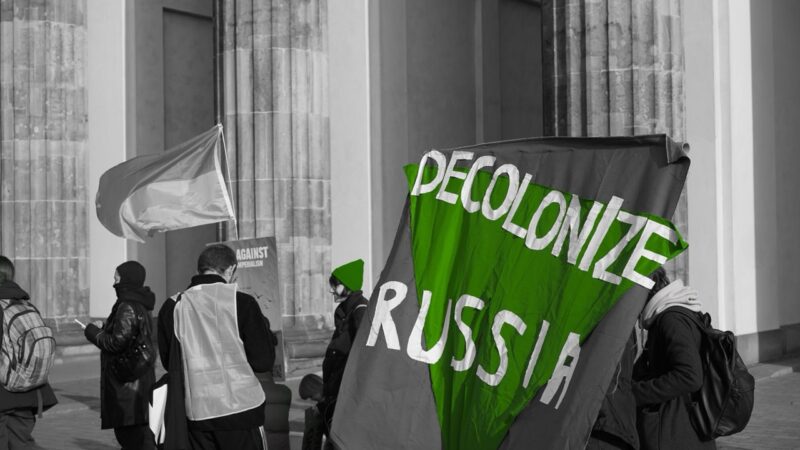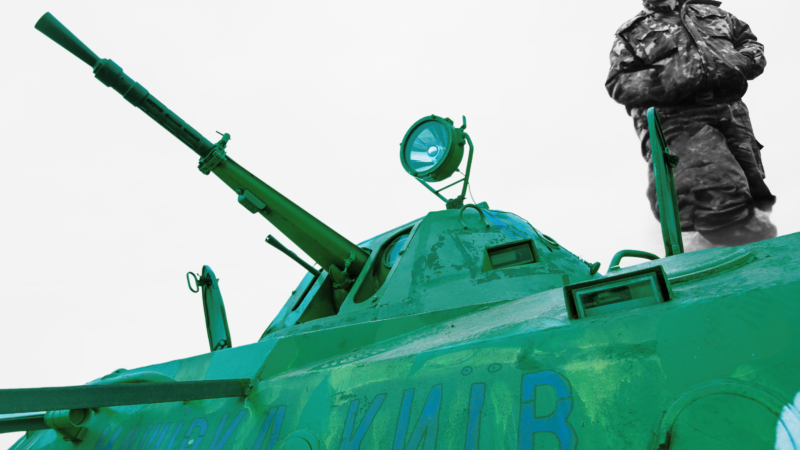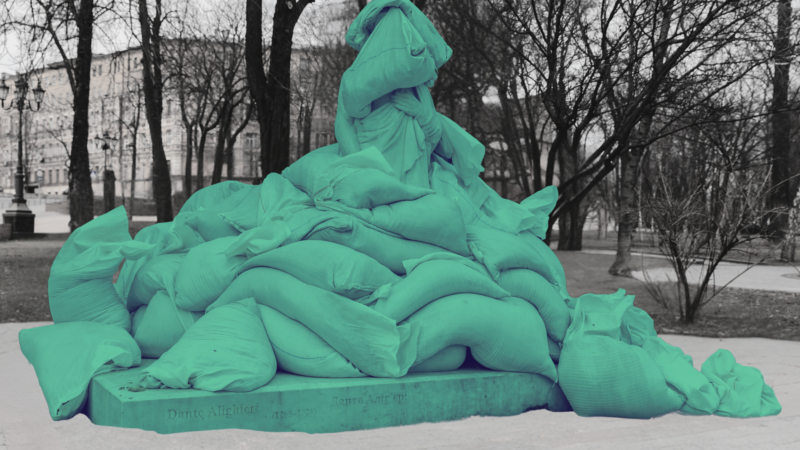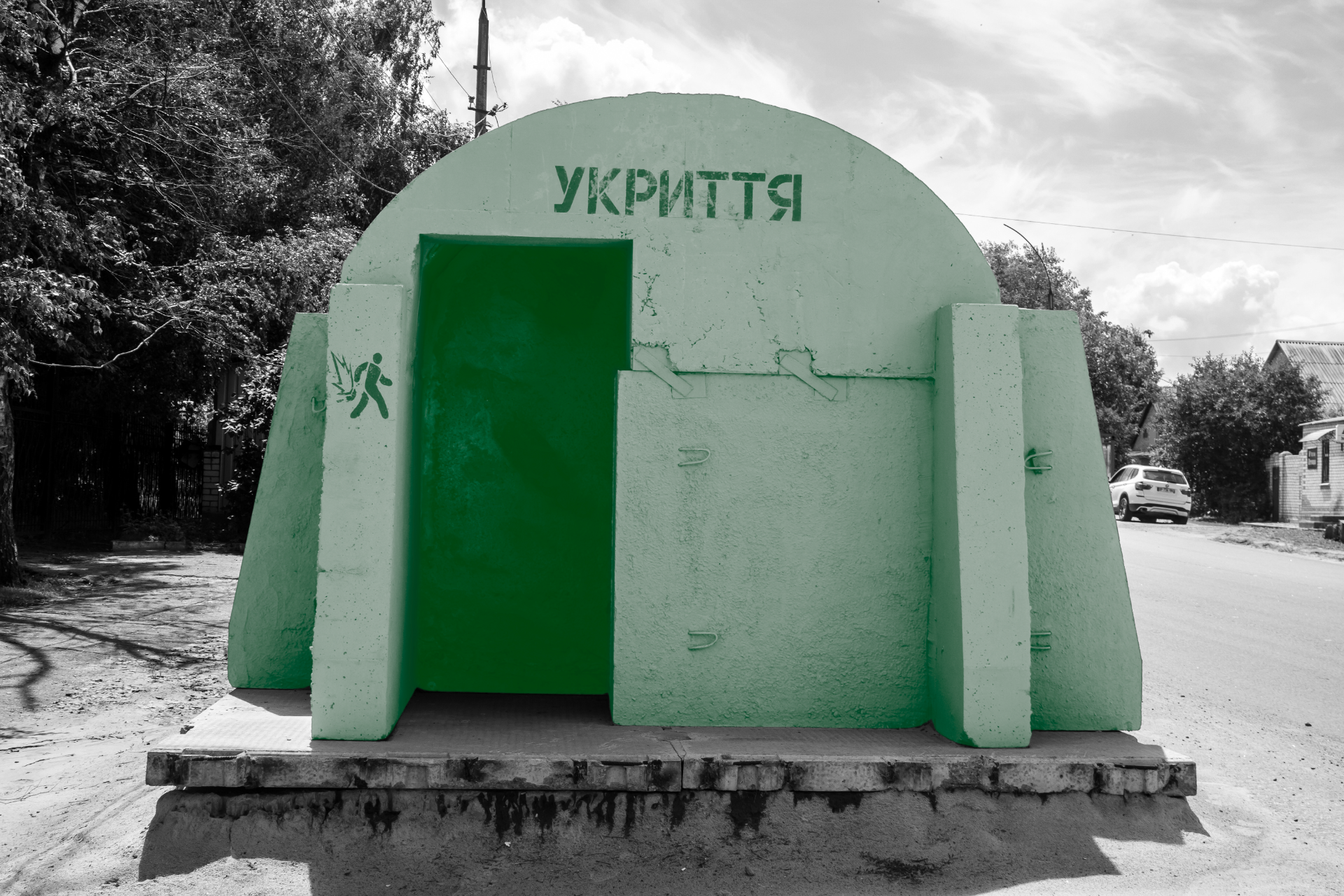Interview with Alexander Vindman: Russia has failed to subordinate Ukraine
The interview transcript has been edited for clarity.
Oleksandr Pankieiev, Editor-in-Chief of the Forum for Ukrainian Studies: What are your main observations of Russia’s one-year escalated invasion of Ukraine? What conclusions can we draw from it?
Alexander Vindman: Well, the most important conclusion is that Russia has failed in its project of subordinating Ukraine, destroying Ukraine as a sovereign independent state. It is no longer feasible for Russia to win through military force.
The biggest potential risk to Ukraine’s sovereignty is a multi-year war in which Russia uses its resources as a country of 140 million people to grind down the Ukrainian population, which is significantly smaller.
But it’s highly unlikely that Russia has the [necessary] power for a multi-year war when it has been such a disastrous war for Russia from the military perspective—and economic costs as well as politically Russia has been isolated. But from a military standpoint, the way wars are won, it’s been a complete disaster for Russia.
The biggest thing is that Ukraine will survive, and Ukraine will survive as a sovereign independent state. It’s no longer the thinking that Western Ukraine is Western-oriented and everything on the eastern side of the Dnipro is Russia. The best Russia could hope for is limited objectives and to freeze the war and retain some control over the four regions that Russia annexed since last year. But that’s still not a likely notion.
So my biggest takeaway is that Russia has fundamentally lost this war already, because its project was to eliminate Ukraine as an independent state. Ukraine is one.
The question is, then, details. What does Ukraine look like? What are the boundaries of Ukraine? How severely damaged is Ukraine? Could it reconstitute as a prosperous state that could integrate with the West? And how much of the damage that Russia has suffered will fundamentally undermine Russia as a regional power?
Pankieiev: Looking back now, can we say that it was predictable and preventable? The West and the US, particularly, knew about the planned invasion months ahead. What was not done? Or what was done wrong?
Vindman: Too much has been wrong, frankly. I think that there was a lot of equivocation and political hedging that suggests that the US was aware that war was coming. I think the fact is that the US ultimately determined that war was coming much, much later than what they’re trying to present now.
It wasn’t until the negotiations and diplomacy failed in January that the US finally realized that war couldn’t be averted. Up until that point, there was still plenty of senior leadership in the US that were saying, well, this could be a demonstration, this doesn’t necessarily mean full-scale war. So I think we got that wrong.
And it was clear the telltale signs of full-scale war were present in October, November, increasingly clear through December and January. I was writing about a full-scale war in December and then laying out the way that Russia was going to conduct a full-scale-war—not a limited war with limited objectives for just the Donbas but to seize, capture, and destroy Ukraine as an independent state.
I think part of the consequences of this kind of thinking, this equivocation about whether the war was coming, influenced the ability to provide Ukraine support. Because the thinking from policymakers was: “Well, if this is not a war, if this is just a demonstration, wouldn’t giving Ukraine military arms precipitate the war that we’re trying to avoid?”
In fact, if we had recognized that war was definitely coming and started to provide significant support to Ukraine before the first shots were fired, it [w]ould have sent a signal to Russia that the US, the West, the Euro-Atlantic Alliance as a whole, were going to be there for Ukraine. And maybe even [they could have] played some sort of role in deterring the war.
Instead, we were completely reactive. The US, as a policy, was entirely reactive, not providing really anything in terms of significant materiel. We provided limited numbers of javelins, anti-tank systems, and air defence systems. Somewhat modest: nothing that was going to change Russia’s calculations about whether to conduct this war. Everything else came very, very slowly afterwards—and reactively, mainly because of some misplaced fears about Russian escalation that never materialized.
We don’t have a complete strategy; we have something far more rather amorphous about supporting Ukraine—“for as long as it takes” but not “whatever it takes” yet.
Pankieiev: How would you evaluate the current level of military help Ukraine receives from its Western partners? Is it what Ukraine needs now, or is it still insufficient to liberate the occupied territories?
Vindman: Unfortunately, I think we’ve continued to under-resource Ukraine. If Ukraine is, in fact, fighting for the rules-based international system that has enabled the US, Canadian, and European democratic prosperity, we should be giving Ukraine all the resources it needs.
That’s not the way that this war ends quickly. That’s a recipe for a long drawn-out war, a war that lasts years—instead of giving Ukraine all the resources it really needed from the beginning, where Ukraine could have terminated Russia’s theory of victory, which is this campaign of grinding down the Ukrainian armed forces. We could have provided the long-range artillery, the tanks, the armoured personnel carriers earlier. We didn’t do that. We’re still resistant to providing air power and unmanned drones. It’s a bit of negligence, I think, on the part of the Euro-Atlantic Alliance, where for really a negligible contribution of resources we could end the biggest threat to the international system since World War II.
And I guess the last thing I’ll mention about this is that the US has poured in tens of billions of dollars of resources to help Ukraine win—even in this limited, insufficient manner—but [nevertheless] it’s tens of billions. And some of the US industrial base is shifting to be able to continue to support Ukraine and rebuild the depleted stocks of military materiel, which the US will need—either to fend off Russia but mainly focused on China. We now are learning what sort of war we will probably face with China also. But if that’s what the US is doing, then the rest of the Euro-Atlantic Alliance has done far, far less.
I mean, even this government—the Canadian government—has really kind of supported Ukraine on the cheap. As a portion of Canada’s gross domestic product, or defence budget, it seems like a lot. But it’s not retooled, it’s not saying “okay, we need to invest much more resources into defence in this very critical moment.” It’s all under the assumption that “while this war could end in the next six to nine months, why should we retool, why should we put large defence orders? Why should we take resources away from other economic activities?” That is a mistake.
In this crisis moment we need to make sure that we’re properly resourcing not just the fight in Ukraine but also deterrence in China. I think that we need to do at least as much, if not more. But the same thing goes for the rest of NATO; the Alliance needs to step up and contribute in a much bigger way.
Pankieiev: US President Joe Biden, when asked whether President Volodymyr Zelensky needs F-16 fighter jets, replied, “He doesn’t need F-16s now” and that there is “no basis upon which there is a rationale, according to our military now, to provide F-16s.” What is your opinion on this? Is it true that Ukraine does need any fighter jets to conduct successful offensive operations this year?
Vindman: It’s smoke and mirrors—seemingly applying some analysis to something that’s illogical. It’s the ability to say, “Well, our military experts have looked at this, and have judged that there are other systems that Ukraine needs. And for efficiency purposes, we shouldn’t be talking about F-16s, we should be talking about other systems”—that is invalid.
There is no world in which you’re giving Ukraine more advanced aircraft—even though it might take six months to get there—giving Ukraine a better opportunity to take control of its skies, that doesn’t make military sense. I think it’s a bit of strategic negligence to say that we don’t need to make this investment, where it takes a long time to build the military base for support—and they’re one of the most advanced aircraft in the world. Training pilots, training mechanics and engineers, and providing a logistical base for operating a sophisticated Western platform—that takes a long time, and we’re not making those investments now. We should have done that months ago, six, nine months ago. And [now] we would have been in a position where Ukraine would have trained pilots, would have these resources.
Eventually, Ukraine is going to transition to Western-made equipment, to an entirely Western-equipped force. It may not be F-16s, it could be Swedish Gripens, it could be Tornados, it could be any number, it could be Rafale fighters. It doesn’t have to be the latest, fourth-generation-plus fighter, but it should be something far more advanced than Soviet-era MiG-29s. So I think it’s unfortunate that the rhetoric hasn’t changed, [because] the reality has changed.
And even Biden, within that same speech, will say, “We’re going to give Ukraine everything it needs”; this rhetoric shows a little level of urgency, commencing with the crisis, but the actions don’t. So it’s really troubling that we’re still in the place where we’re saying, “Well, they don’t need this, we’re not going to give them this”—when we know at this point, looking at the way the support to Ukraine has unfolded, we know that we’re gonna get there. It’ll just be a matter of time.
We said that tanks would cause World War III, but we gave them tanks. We said all these different things and we completely blew past them. When I talked to the Biden Administration, when I talked to the National Security Council way back in the days before [all-out] war and after it started, I told them that they are going to do things that they think are impossible. They will ultimately provide Ukraine with all the support it needs, it’s just a question of when. And they have slowly moved in that direction—but frankly, just too slowly, with a high degree of risk that is unnecessary. Because a long war is not just damaging to Ukraine, it’s also damaging to the United States. It’s damaging on the basis of the fact that the Russians can incrementally escalate or the Chinese could see some opportunities to step in and embarrass the US and support an authoritarian regime. It is too close for comfort, when the stakes are so high, to provide, you know, this kind of really quite slow, insufficient support.
Pankieiev: It’s also a hybrid war, and information plays a huge role in this. I remember months ago, before the full-scale invasion, Jens Stoltenberg and many other officials repeated many times that NATO and the US would not be fighting “for Ukraine.” This also contributed to Putin’s decision to invade Ukraine. It seems like the West is making the same mistake right now.
Vindman: Well, it’s longer than just this period, frankly. This is, let’s say, a microcosm of the broader relationships that the US has had with Ukraine and the Russian Federation since 1991—namely, [an attitude of] primacy towards Russia and stability in the relationship with Russia, averting a crisis with Russia, and preserving the possibility of a long-term cooperative relationship with Russia. All at a cost to Ukraine.
It’s a mistake that in the short term we do things that minimize the risks, without recognizing how those decisions in the short term stack up into a very, very acute crisis in the long term. We keep buying down the risks in the short-term, while in a way breeding impunity and with Vladimir Putin believing that he could get away with it.
That’s the story of 23 years for Vladimir Putin [since he succeeded Yeltsin in 2000]: at almost every turn he’s suffered nearly no consequences. And he was trained to believe that: “Why couldn’t I conduct this war? What [have I got to lose]? The Ukrainians are going to fold, the West might render some punishments for a short period of time. Why not?” We see the same thing playing out now in the Biden Administration. It’s shifting to kind of—frankly, more of a consistent relationship with Ukraine, but still way too slow.
Pankieiev: We are witnessing an ongoing heavy battle for Bakhmut. What is happening there now? What is the strategic significance of that location if Russia gains complete control of it?
Vindman: It’s troubling. I think they’re going to start to get more and more criticism. I’ve been talking about this for probably six weeks, maybe eight weeks, and I’m very concerned about what’s going on in Bakhmut.
Bakhmut itself is not strategic. It’s only taken on a strategic significance because Volodymyr Zelensky has put a lot of his own credibility on the line with regards to saying that we’re going to hold Bakhmut, we’re going to win here.
From a military perspective, I mean, not everything is that black and white; there are concrete tactical, operational reasons for areas. If they’re transit hubs, if they’re rail networks, if they’re controlling terrain for a region, they might have a significance of their own or a piece of ground that allows you to conduct follow-on operations. But Bakhmut doesn’t really hold any of those, you know—minor, let’s say—tactical advantages. In general, it’s not that important.
But it’s turning out to be a strategic fight between Russia pouring all sorts of resources to take the city and Ukraine defending at all costs. I think it’s a mistake.
Where Ukraine was successful for much of the war up until this point is that they traded space for time, inflicting massive casualties on Russians and then sapping Russia’s ability to conduct offensive operations—we call it forcing the Russians to culminate, where they can’t conduct any more offensive operations and have to shift to defence. And then Ukraine is able to pick and choose where to fight.
That was the recipe for success in Severodonetsk, Donetsk, and Luhansk. Those tough fights, in which Ukraine ultimately withdrew but Russia had no ability to continue to fight, allowed Ukraine to pivot to a very successful offensive in Kharkiv and a very successful offensive in Kherson.
For some reason, the Ukrainian military—but its political leadership in particular—has decided that they want to fight in Bakhmut and hold it at all costs. The problem I see with this is that while Ukraine is inflicting significant casualties on Russia, it’s also taking significant losses. And that’s a problem, because eventually, when Russia does run out of steam and can’t conduct any more offensives, Ukraine may also run out or not have sufficient capacity for a counteroffensive.
And that’s troubling. To me, unless the Ukrainians are absolutely sure they could win and preserve combat power for an offensive in the spring and summer, to me this doesn’t make a lot of sense. And I think there’s an element of pride—you know, that Ukraine has lost too much and too many people have been sacrificed to let the city go. But it’s troubling, because I think Ukraine is taking some significant losses around Bakhmut.
Pankieiev: What is your prognosis of how the war will develop this year? What should we expect from Ukraine’s planned offensive operations this spring and over the summer?
Vindman: I was more confident about this, you know, some six weeks ago or two months ago, and I looked at it as campaign cycles. Russia would run an offensive that would peter out, wouldn’t really achieve anything, or maybe small tactical gains like, you know, taking Bakhmut. And Ukraine would then seize the opportunity afterwards, when Russia switches to defence, to liberate large chunks of territory—again, like Kharkiv, like Kherson.
My assessment was, up until recently, that you’d be in one of these campaign cycles—Russian offensive, Ukrainian counteroffensive—and then Russia would basically not be in a position to continue to fight this war without another mass mobilization. And then Putin might choose to negotiate in order to hold what he has, hold some portions of the Donbas, or hold on to Crimea, because Ukraine would be successful.
With the way things are shaping up in Bakhmut, it introduces an element of risk and doubt that we may not have a full “Russian offensive – Ukrainian counteroffensive” campaign cycle. If we don’t [manage the counteroffensive this time], Russia has the breathing room to do another call-up and conduct another offensive. And then Ukraine hasn’t gained anything, it hasn’t liberated territory as it did in the summer and fall of last year.
Right now, I still think the leader of the Ukrainian Armed Forces, [Valerii] Zaluzhnyi, is probably going to eventually conduct a similar operation to what he did in Eastern Ukraine, in the Donbas last year: withdraw and make sure he has the means to conduct an offensive later. I think if that’s the case, the way I see this playing out is that by late summer Ukraine will liberate additional territory. And then we could start to hear much more substantive conversations from the Russians about negotiations. But that’s where I think this is going to fall out.
There’s a small chance that this just drags out for another campaign cycle, another six to nine months, and deep into 2024. And that becomes quite risky, because we’ll see another Russian mobilization, we’ll see too little support coming in from the West, and none of this equipment is not going to come in a large formation—like armoured formations that have the ability to penetrate through Russian lines. Instead, they’re rather piecemeal, with small dribs and drabs of equipment coming in to stabilize the lines. And if this extends through 2024, then there are also some questions emerging about Western support. Will the US continue to support Ukraine in the same way? Will the rest of the Euro-Atlantic Alliance continue to support it in the same way? So I think, again, it’s too close for comfort.
The US, as a world leader in the arsenal of democracy, should be providing more support. Ukraine should be very, very thoughtful in its strategy and determining what works, and we could start to see a winding down of the conflict towards the end of the year. That’s a bit of an optimistic view, but it’s feasible, it’s realistic, that we could start to see that.
And then there’s the other side of the coin, where we don’t do enough and Ukraine isn’t successful at the strategic level. And we see this war extend through another year.
Pankieiev: In your essay for the Foreign Affairs magazine, you discussed the possibility and impossibility of liberating Ukrainian territories. Do you still think it is possible, and what is needed to achieve it?
Vindman: I laid out a course of action in which Ukraine had a very, very difficult road to liberate Crimea. I laid out a scenario in which, if everything worked out well, they would be able to do that. But my ultimate conclusion was that it might be too costly an operation, even back then.
The reason is that considering it just as a military problem, there are not that many ways to get to Crimea; it’s a peninsula with limited access. And so the Russians know exactly where the Ukrainians are coming from. Ukraine doesn’t have an amphibious capability to be able to attack across the water. That would be very, very challenging.
The purpose of the article was mainly focusing on arming Ukraine with all the resources Ukraine needed to make Russia’s position on Crimea untenable, as well as destroying the Kerch bridge and making sure that Ukraine has all the resources to really punish significant portions of Russia’s military infrastructure. It’s a possibility, although I think it’s not the most likely course of action. Other analysts are more rosy and optimistic, but I think it’s a stretch.
Pankieiev: But it seems like Russia is considering that this scenario is possible, because recent imagery from satellites, and also some videos, show that Russia has constructed some trenches on the [Crimean] shoreline.
Vindman: That’s true. I think the fact is that it doesn’t take a huge application of resources, it’s actually pretty modest, to put up trenches and fortifications on Crimea and not necessarily rely on a huge amount of force to defend them, because they are fortifications on top of a water obstacle. So you don’t need a lot of manpower to defend those. But every little bit helps.
Russia has also fortified the entire front line behind the advance troops in the same way. So it’s a relatively modest application of resources. The biggest challenge that Russia has is trained troops, and being able to man those defences. Once Russia shifts to defence, that’s going to be a challenge for Russia.
Pankieiev: If I am correct, you also don’t exclude the possibility of tactical nuclear strikes by Russia. How likely is Russia to use nuclear weapons, and what can it achieve if it uses them?
Vindman: So there are a lot of reasons why Russia won’t use nuclear weapons in Ukraine. But the one time that it makes sense for Russia would be Crimea. That’s the point I was making. It’s not that it’s likely or significantly more likely, because the use of nuclear weapons is strategic in a global context, not strategic in just a Russia-Ukraine war context.
The use of nuclear weapons would isolate Russia in a way that it hasn’t been isolated thus far—from its last remaining relationships, with China and India. And it would potentially precipitate all those limits on US and Western support, could potentially be limited… It could introduce the possibility, although remote, that NATO gets directly involved, because the use of nuclear weapons that close to a NATO territory may necessitate NATO establishing a no-fly zone to make sure that there was nothing, no accident of a strike on NATO territories. So I think there are a lot of reasons that Russia wouldn’t go down that road.
But in my scenario Ukraine is successful: it destroys the Kerch Bridge, threatens or destroys Russia’s land-bridge, and then starts to posture forces for an attack on Crimea. That concentration of forces and along the front line—it takes a lot of force to break through into Crimea—that concentration of forces is also a lucrative target for nuclear weapons, tactical nuclear weapons. So out of all the periods of time, that’s where it might make sense from a tactical level. It might make sense for Putin given the fact that Crimea is his kind of crown jewel. It would be deeply embarrassing to him if he lost Crimea. So the chances are higher but not significantly higher because on the other side, the use of nuclear weapons would be extremely costly to Vladimir Putin.
Pankieiev: What are other resources and options that Russia has left to continue the war?
Vindman: Russia doesn’t have inexhaustible resources; it’s a country of 140 million people, but it’s a country that has somewhat modest capabilities. This is not the Soviet Union mobilized for World War II, you know, full mobilization. It’s not a country of 320 million people—it’s a country of 140 million people, much smaller than the aggregate Soviet Union and much weaker in terms of economic resources.
Even that population of 140 million people is a bit of a mirage. It somehow implies that it’s three times the size of Ukraine and therefore has three times the manpower, but that’s not true. Estimates are, for instance, in the United States that at any given moment only about 23 percent of the military-age male population in the US is adaptable for military service: they’re healthy, psychologically fit, and reach the basic aptitude standards. If that’s the case in the US—with a much, much healthier society—we are talking about a fraction of that available in Russia, let’s say, 10 percent of the military-age male population is useful for military service. So that means that it’s a pretty limited resource, it’s a perishable resource.
Russia started this war with, on paper, a military of 800,000. The attacking force is closer to about 150,000, but it cycled through, at this point, somewhere in the ballpark of about 300,000, 350,000, maybe 400,000 troops, and that is a lot. Many casualties—we’re talking about well over 100,000 killed and severely injured, out of the fight; It’s probably closer to 150,000, maybe even 200,000 now (the numbers on this are tough). So that’s why Putin had to do a call-up of 350,000 troops.
They don’t have an endless supply of military-age males. They’re using penal battalions to fill the ranks of the Wagner Group. Not only is it a problem just actually conscripting those people, but when Russia tried to do the mobilization back in the spring for 300,000, three times as many people left the country. That is a pretty costly decision: you’ve basically lost somewhere in the ballpark of a million people. Some of them have been mobilized into the force, a lot of them have already been killed, and half of that 300,000 is already out of the fight. And then a huge number has left the country because they have no interest in serving. Imagine that Putin did the same thing for another 500,000 and another 1.5 million left the country because they did not want to serve. How many times can Russia go through that, with this relatively modest amount of military-aged males, before it runs out of military capacity? So it’s not endless.
Nor is it a guarantee that just because Russia calls these personnel, it’s going to be successful. With those 300,000 troops that Russia called up previously, it was able to stabilize the lines, [but] it didn’t really enable offensive operations. Russia is still fighting for the same territory it’s been fighting for from the beginning. The Ukrainians haven’t been able to take territory, but Russia’s made [only] very tiny gains. So, another 500,000 troops may not necessarily be as meaningful in terms of allowing Russia to annex additional territory. But it’s also at a huge cost—in manpower, in internal stability—so I think it’s increasingly hard for Putin to make the decision to move in that direction.
Pankieiev: What are your most realistic scenarios for how the war could end? Are there any possibilities of a revolt among the Russian military or political elites against Putin’s regime?
Vindman: To me, as a strategist, this is the beginning of the end of Putin and Putinism. I think that could play out over the course of years, not months. I think the fact is that ultimately the costs—economic costs, the isolation, the manpower, the folly of this campaign against Ukraine—are going to wear down Putin and Putinism. Nothing acute, not a coup, not mass protests; I don’t see the signs of that.
But ultimately, Putin is going to pay the cost for this. Again, I think that could be over the course of the next year and a half, maybe, because he’s up for reelection in 2024. Maybe, if this war was over relatively quickly, I could see him putting in somebody else, as he did with Medvedev, who would be the face of Russia, to normalize relationships. The longer this war goes, the less likely he is to step down; that means Russia is isolated for longer, for another six years, if Putin remains the head of state. At least from a conceptual standpoint, I think it would be hard for him to maintain power after this disastrous war.
I need to think about this a little more, because I was thinking about it consistently at the beginning of the war, the cost for Putin. I haven’t really reassessed the risks more than a year into the war. But if I had to make a judgment call, I don’t see any real domestic risks right now for him. He’s still quite popular; there is no real sign of popular discontent, with mass protests. That was the hope behind large sanctions on Russia, which were supposed to suppress GDP by 15–20 percent; instead, only 2.5 percent of Russia’s GDP has been impacted.
This next year will be different, because part of the reason that Russia was able to weather the sanctions was oil prices. Russia will not enjoy those oil prices in the middle of [this] mild winter. Oil prices are low and will get lower when it warms up. So, the ability to cushion the sanctions is not going to be there. There might be something, socio-economic protests that could emerge; the costs of all these tens of thousands of casualties might wear down [the economy]. But right now, given the fact that Putin’s security apparatus is really untapped—they haven’t had to do mass repressions, they haven’t had to suppress mass protests—I think there is no real significant risk from popular discontent yet.
And the idea of a coup also seems remote, because although these elites don’t have the ability to travel in Europe and send their kids to elite universities, they’re still at the top of a rotting system in Russia. They know that to maintain their hierarchy, they need to continue supporting Vladimir Putin, so I don’t think that will change either. So the idea of a palace coup seems remote—only in the case of an extreme scenario, like Putin wanting to go to nuclear and then the elites recognizing that that could be the end of them also.
In 2023 we expect that the Forum will grow even more rapidly and become more influential. To sustain this growth, we need to expand our supporter base and will be grateful for your support by any means that is suitable to you—by sticking with us and sharing our materials with your friends and colleagues; by writing for us with expert knowledge to share with the world; and by becoming our donors, because without donations the Forum won’t be able to survive and thrive. Contact us to learn more about how you can donate to the Forum and the Media Monitoring Service, helping to build Ukrainian studies for a better future: ciusweb@ualberta.ca





